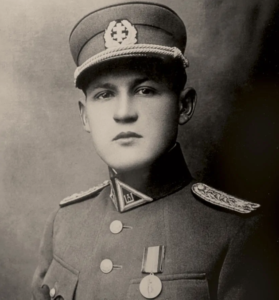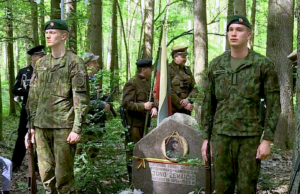Europe Diplomatic Magazine fully adheres to all internationally accepted standards and codes of conduct for journal editors, and consequently abides by the rules and regulations governing this field of activity.
These include the two following basic obligations regarding accuracy :
1 – The Press must take care not to publish inaccurate, misleading or distorted information or images, including headlines not supported by the text.
2 – A significant inaccuracy, misleading statement or distortion must be corrected promptly and with due prominence, and — where appropriate — an apology published.
In the March 2023 edition of Europe Diplomatic Magazine, we published an article entitled RIGHTING HISTORICAL INJUSTICES – A Lithuanian MEP continues her life-long battle against cruel and rapacious regimes
We publish the reader’s comments and the author’s response herewith, in complete open mindedness and in a conciliatory spirit.
Trajan Dereville, Chief Editor
Dear Kingsley Brooks,
I would like to sincerely thank you for the elaborate feature that you have published in the March issue of the European Diplomatic Magazine (pp. 34-39). I was humbled and flattered to find such a comprehensive article featuring my work at the EP and beyond.
There was, however, a paragraph that I found deeply unsettling. While I fully understand the wish to present different sides of every story, the attempt at objectively portraying the figure of Jonas Žemaitis- Vytautas has allowed an untruthful Soviet narrative to seep into the article.
Selective and often outright falsified narrative of the World War II was at the heart of Soviet historiography and the legitimizing myth of Soviet greatness. Discrediting Lithuania’s (and other Soviet- occupied countries’) resistance against the occupation was one of the key components of this grand narrative. Just as in Ukraine today, the Nazi or fascist label was one of the main tools used. Unfortunately, the paragraph in question features untruthful claims that discredit the memory of Jonas Žemaitis-Vytautas. The paragraph is quoted below:
“Jonas Žemaitis has been described as pompous with an inflated ego when he became an officer. He has also become involved in street-fighting, which hardly seems very heroic. He may also have been one of a group of deserters who surrendered himself to the Germans, but that’s not something that Lithuanian patriots like to talk about. And it may not even be correct, of course. It’s also true to say that even if people like Žemaitis-Vytautas were not the flawless heroes the stories like to convey and even if he swore undying allegiance to Adolf Hitler when he joined the Auxiliary Police Service Battalion, in the end his service to his country and its independence was valuable, which is presumably why he still has the admiration of Juknevičienė, who would clearly never have aligned with the Nazis.”
Jonas Žemaitis-Vytautas does not just “presumably” have “the admiration of Juknevičienė”. In 2009, Lithuania’s Parliament adopted a declaration recognizing Jonas Žemaitis-Vytautas as the de facto President of the Republic of Lithuania between 1949 and 1954, as he served as the Head of the state- succeeding organization that fought to restore country’s independence1. He was the leader of the Union of Lithuanian Freedom Fighters – country’s organized armed resistance against the Soviets – which, although comparatively “little” (as noted in the article), included around 100 thousand members who sustained the fight for nearly a decade until 19532. The resistance was systematic and organized; it is assessed to have had significant consequences for local Soviet policies and laid the foundation for later dissident resistance against Soviet totalitarianism3.

Given his importance and state-level recognition, extensive historical research has been conducted into Jonas Žemaitis-Vytautas biography with the purpose of delineating the truth and casting out Soviet lies. The paragraph above, although carefully worded, insinuates that Žemaitis-Vytautas biography is ambiguous, not known, and that he is likely to have collaborated with the Nazis. Neither is true. I am convinced that reputable media outlets have a duty not to feature unverified and untruthful claims in any form.
1 https://e-seimas.lrs.lt/portal/legalAct/lt/TAD/TAIS.339103
2 https://genocid.lt/centras/lt/1486/a/
3 https://www.bernardinai.lt/2017-09-21-1944-1953-m-partizaninis-karas-tautos-pergale-ar-pralaimejimas/
Firstly, I would like to inquire into the sources of the claims about Žemaitis-Vytautas personality – I have not come across such character judgement. To the contrary, I have come across positive assessments (e.g. see the official evaluation by his superiors at his attestation upon graduation in Eidintas, Soudaitis, Surgailis, 2020, p. 26, where he is described as “tactful, polite, tidy” and “virtuous, honest, just”). Moreover, I struggle to see the political importance of discussing how his character may have been perceived. What were the reasons behind choosing these particular subjective impressions as important facts to note in this article? And what were the sources?
Secondly, Jonas Žemaitis did desert from the Red Army and surrender to the Germans. This is a well documented fact; there is no conspiracy around it. “Lithuanian patriots”, as they are referred to in the quoted paragraph, do talk about this, as this was part of his biography. Understanding the historical context is crucial in judging it, however. After the Soviet Union annexed Lithuania, country’s armed forces were also forcibly incorporated into the Red Army. By extension, Žemaitis automatically became a Red Army officer. Deserting from an army of an occupying totalitarian regime that committed crimes against humanity against thousands (e.g., the forced mass deportations of entire families that started in June 1941 in the occupied Baltic states) is just as much an act of resistance against the occupying force, as it is a willful desertion into the German hands. Importantly, when requested by the German authorities, Žemaitis refused to join German military forces and retreated into the countryside where he joined an underground pro-independence civic movement (Eidintas, Soudaitis, Surgailis, 2020, p. 46 and p. 49). Plainly stating the fact of his desertion next to false claims of sworn allegiance to Hitler leaves a distorted and historically inaccurate impression of willful and substantive collaboration with the Nazi regime.
Finally, and most importantly, Jonas Žemaitis-Vytautas did not swear to Adolph Hitler; to the contrary, he went into hiding in order not to have to enter into a formal alliance with the Nazi authorities. Below you may find a summary of the unsuccessful Nazi efforts to form a Lithuanian SS Battalion, sourced from Jonas Žemaitis-Vytautas biography, published by the Military Academy of Lithuania:
In late 1943, it became clear that the Nazi Germany might lose the war. Lithuania was under the Nazi occupation at the time. The Nazi authorities started mobilizing the local men into SS battalions and Lithuania was the only occupied country where the effort was boycotted en masse. Instead, sensing the nearing possibility of the second Soviet occupation, acting local Lithuanian administration agreed to form the Lithuanian Territorial Defense Force (LTDF, Vietinė Rinktinė), led by Lithuanian General P. Plechavičius and acting with a sole mandate to fight the Red Army if it advances into Lithuania.
Such forces were formally created and thousands of men volunteered to join, including Jonas Žemaitis, who led one of the groups for two months, until the Nazi authorities declared they would rename the LTDF into an SS battalion, issue SS uniforms, and take it under their direct command. General P. Plechavičius refused to follow through with the order and ordered the battalions to only listen to his command. He was arrested by the SS and the Nazi German Police. The enlisted soldiers were taken to the Salaspils concentration camp near Riga, approximately 50 of them were imprisoned. 84 officers were executed in the mass shooting ground near Vilnius and near Marijampolė. Jonas Žemaitis was on leave on those days, but was informed about the situation and went into hiding, as he was also unwilling to comply with the SS orders. (Based on Eidintas, Soudaitis, Surgailis, 2020, pp. 49-51)
In light of the facts above, I feel obliged to react and defend the memory of Jonas Žemaitis-Vytautas, as he is no longer able to defend himself. Considering the weight of the allegations made in the Europe Diplomatic Magazine article and their particular importance for my work as the coordinator of the informal MEP Group on European Remembrance, I would like to kindly request to publish a retraction and correction. I would also like to publish this letter as my reaction in the next issue.
With kind regards, Rasa Juknevičienė
Sources quoted:
- Eidintas, Alfonsas, Darius Juodis, and Gintautas Surgailis. 2020. Partizanų Generolas Jonas Žemaitis–Vytautas (The Partisan General Jonas Žemaitis-Vytautas). Vilnius: Generolo Jono Žemaičio Lietuvos karo akademija (General Jonas Žemaitis Military Academy of Lithuania), https://www.lka.lt/uploads/Dokumentai/Moksline%20veikla/Leidiniai/Gen.%20Jonas%20Zem aitis%20Vytautas%20LT.pdf
- Lietuvos gyventojų genocido ir rezistencijos tyrimo centras (Genocide and Resistance Research Centre of Lithuania). “Antisovietinis pasipriešinimas 1944-1953” (Anti-Soviet Resistance 1944-1953), https://genocid.lt/centras/lt/1486/a/
- Lietuvos Respublikos Seimo Deklaracija Dėl Jono Žemaičio pripažinimo Lietuvos valstybės vadovu (Declaration of the Seimas of the Republic of Lithuania on Recognizing Jonas Žemaitis as Lithuania’s Head of State), March 12, 2009, Vilnius, https://e- seimas.lrs.lt/portal/legalAct/lt/TAD/TAIS.339103. [Last accessed April 26, 2023]
- Vaitkevičius, Vykintas. 2017. “1944–1953 m. partizaninis karas: tautos pergalė ar pralaimėjimas?” (“1944-1953 partisan war: nation’s victory or defeat?”) in Bernardinai. September 21, 2017, https://www.bernardinai.lt/2017-09-21-1944-1953-m-partizaninis- karas-tautos-pergale-ar-pralaimejimas/. [Last accessed April 26, 2023]
| CORRECTING HISTORY
As we all know, Russia has always deployed a wide range of weapons in its long fight against freedom and justice, and one of its most effective is the distortion of truth. Or, to put it another way, lying. In an article I wrote earlier this year about the much-admired Lithuanian politician Rasa Juknevičienė, I think I may have fallen for that same old Russian trick by writing that General Jonas Žemaitis was thought to be a bully with an inflated ego who had surrendered his unit to the Nazis. However, we must bear in mind that following his arrest by the Soviet forces he had been opposing, Žemaitis was interrogated by none other than the notorious Soviet Marshall Lavrentiy Beria. So fearful were the Soviets of Žemaitis becoming a national hero as an opponent of the Soviet Union that they set about destroying his reputation, too. I regret to say that I also fell for it.

I once saw the memorial to Žemaitis, I seem to recall, proudly commemorating a great man and a brave one, who, having fought against the Nazis turned his ire against the Soviet Union. His aim was to secure freedom for Lithuania: freedom from both the far right and the far left. He succeeded, too, eventually, and is rightly remembered as a national hero. I apologise unreservedly to his many admirers for seeming to sully his reputation. So fearful were the Soviets and especially Beria of what the General’s memory could achieve that they have never revealed where they buried his body after his execution by firing squad. They believed that even the discovery of his dead body could harm the Soviet Union. And, of course, they made up a succession of lies.
I cannot remember where I found the negative references I used in my article: there were many, mixed and a long time ago. I shall endeavour to avoid any that have a smell of Russian propaganda in future. At this dangerous time, the world has the need of more people like General Jonas Žemaitis to take a stand against that arch-liar, Vladimir Putin. I am glad, however, that it has honest and brave politicians like Rasa Juknevičienė to point out errors and to defend the reputations of those who are themselves honest and courageous.
Sincerely,

